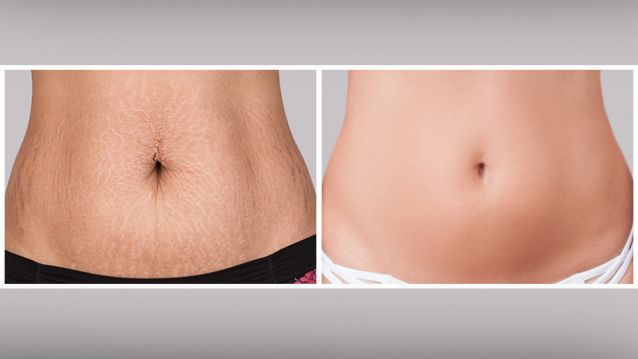Skin is incredibly elastic. It stretches as we stretch and grows as we grow. So, it only makes sense that after weight loss, especially quick weight loss, you could be left with excess flabby skin. But don’t stress, skin is a living organ, which means it will eventually return to fit your new shape.
The trouble is, that could take about two years. Age, smoking, dehydration and genetics also play a role. In the meantime, there are things you can do to help speed the process.
Here are seven things you can do to help tighten your skin faster after weight loss:
1. Don’t lose weight too quickly
It’s natural that most people want quick results when dieting. Let’s face it, quick results motivate us to keep moving forward. But with extreme dieting often comes extreme fat and muscle loss. People who lose a massive amount of weight are often left feeling unhappy about their bodies. Sure, the fat is gone, but all that skin is still hanging around.
That said, not everyone who loses a significant amount of weight struggles with excess flabby skin, according to experts. Some people can drop over 100 pounds and their skin still remain tight. Yet, others are left with flaps in areas such as the belly and arms.
Flabby skin can happen with weight loss due to diet and exercise. But it seems to happen more often after weight-loss surgery, like bariatric surgery. Slower, more gradual weight loss is easier for skin elasticity to snap back into place and shrink as the fat is lost. But when too much is lost too fast, the skin’s elasticity doesn’t have time to recover.
2. Don’t smoke!
More than ever, you need to stop smoking! We now know all too well that smoking kills. It may be hard to quit that nasty habit, but if you’re not worried enough about dying from cancer then think of your skin. Smoking will ruin it! Not only does it accelerate the aging process of skin but it also decreases vitamin A and moisture in the skin, causing elasticity to break down.
However, quitting smoking actually rejuvenates the skin, according to a study from the International Association of Ecologic Dermatology. Researchers analyzed the skin of 64 female smokers for lines, vascular and pigmentation state, elasticity, brightness and texture. Before quitting, smoking aged the skin by nine years. But after quitting for nine months, researchers found that the biological age of the women’s skin reduced 13 years!
3. Eats lots of fruits and veggies
Hopefully, after losing that weight, you’re sticking to a maintenance plan that includes eating plenty of fruits and vegetables. But if you’re not, then consider this. Your skin is a living organ and needs a wide variety of nutrients to stay healthy and elastic.
In fact, a European study found that eating fruits and vegetables — particularly those high in carotenoids like sweet potatoes, dark leafy greens, carrots and tomatoes — has a measurable and perceptibly beneficial effect on skin appearance within six weeks.
4. Eat appropriate amounts of protein
Two necessary ingredients for maintaining plump and elastic skin are collagen and elastin. Protein-rich foods such as chicken breast, eggs, lean beef, tofu, nuts, legumes, seeds and fish all contain collagen and elastin forming components. How much protein you need depends on your weight and lifestyle. You can calculate your protein intake by using this bodybuilding.com calculator.
5. Build your muscle
Alongside side of nutrition, it’s important to also focus on muscle-building exercises to slow the loss of muscle as you burn fat. The skin has a layer of fat underneath — and then muscle. High-intensity cardio will burn fat but also increase muscle loss.
If you burn that layer of fat under the skin and still maintain muscle, you’ll appear firmer. By the time you hit your target weight range, you’ll have reduced the percentage of muscle loss compared to the fat loss. That means tighter skin and better health.
6. Choose natural supplements for skin elasticity
Unless your daily diet consists of foods like oxtail and chicken feet, then it may be hard to get enough gelatin to maintain skin elasticity. A study conducted at Stanford University found that supplementing with 250 milligrams of gelatin a day improved skin elasticity.
Borage oil
The study concluded that also adding borage seed oil in combination with gelatin seemed to demonstrate even greater skin elasticity.
Collagen
Many people supplement with collagen to help joint pain. But now collagen is becoming more popular as a treatment for aging skin. A German study found that taking 2.5 to 5 grams of hydrolyzed collagen significantly improved elasticity after eight weeks.
7. Finally, stay well hydrated!
Staying well hydrated is crucial for preserving skin elasticity. Drink plenty of water and beverages like green tea to maintain healthy skin and moisture. When your skin is dehydrated, it affects the layers of the skin by decreasing firmness, leading to saggy skin.
The bottom line: taut and supple skin really depends on how fast you choose to lose weight and how you maintain your weight loss. So, before heading to a plastic surgeon and spending thousands of dollars, why not use the tips above and your tighten your sagging skin naturally? Good luck!
— Katherine Marko

